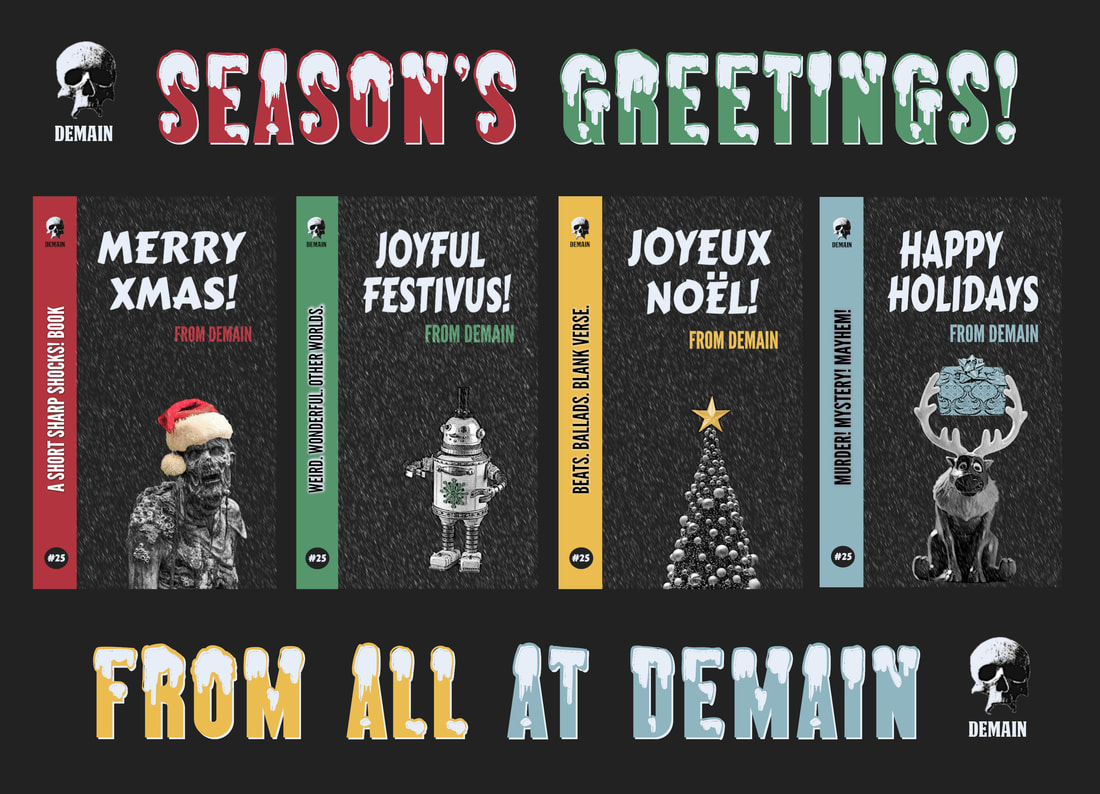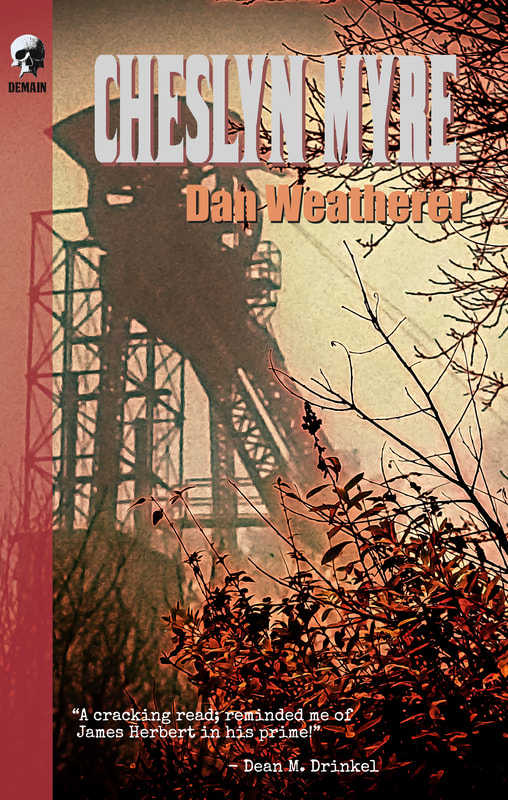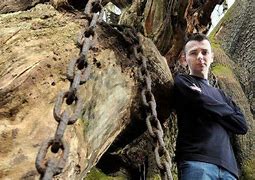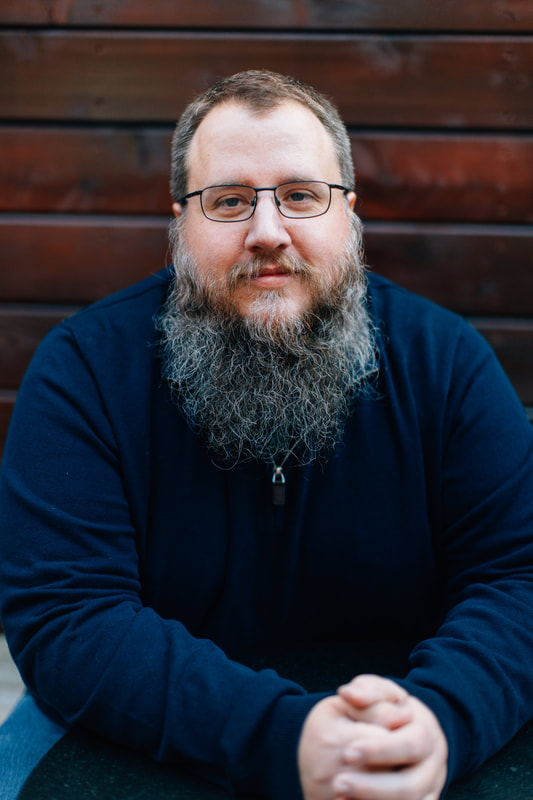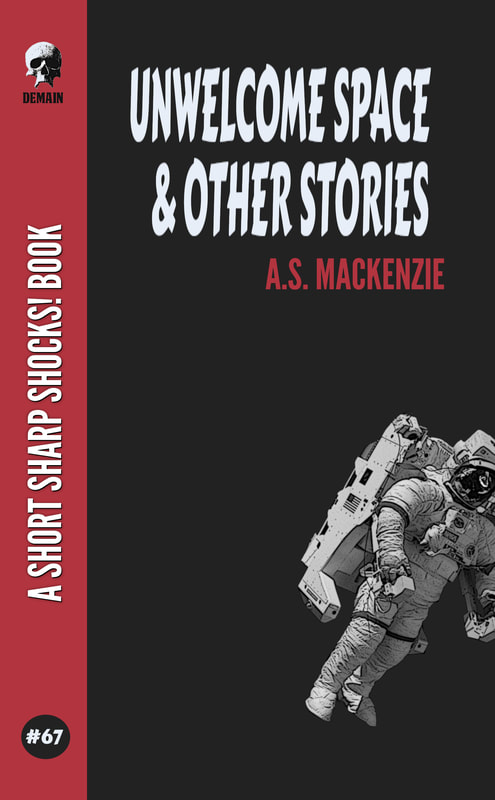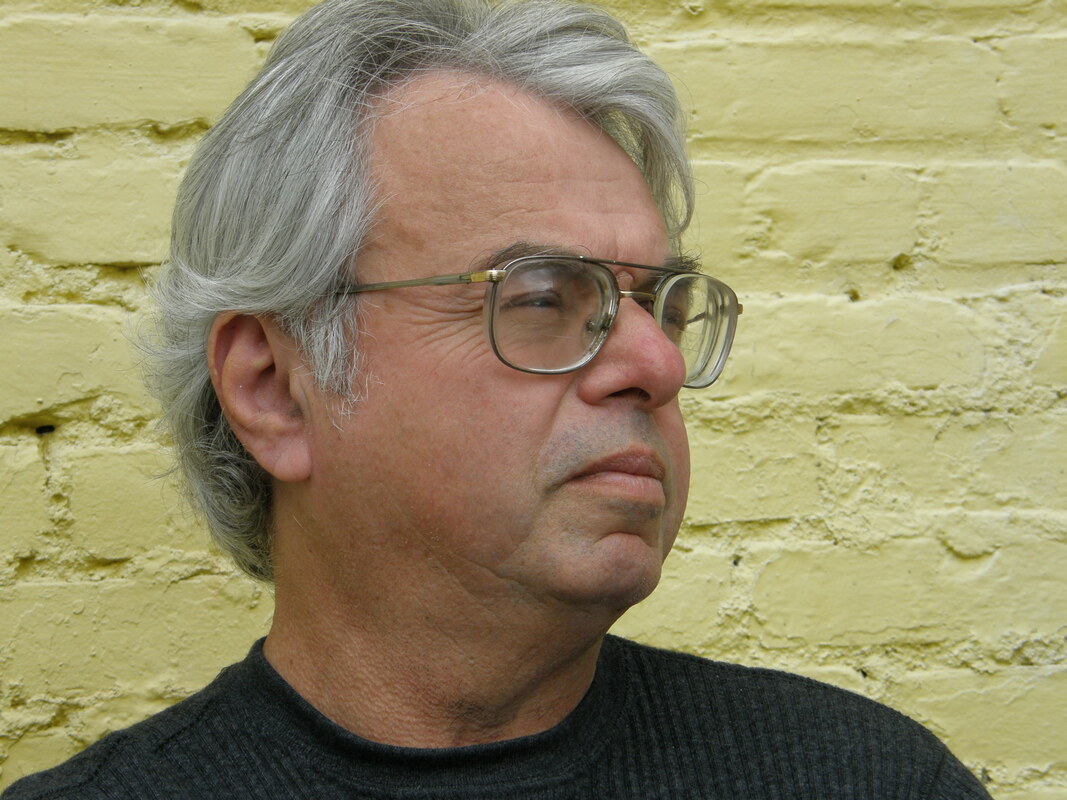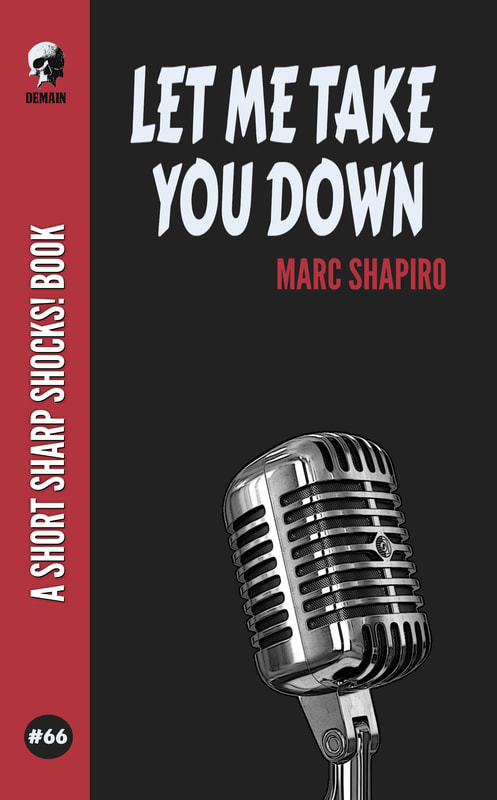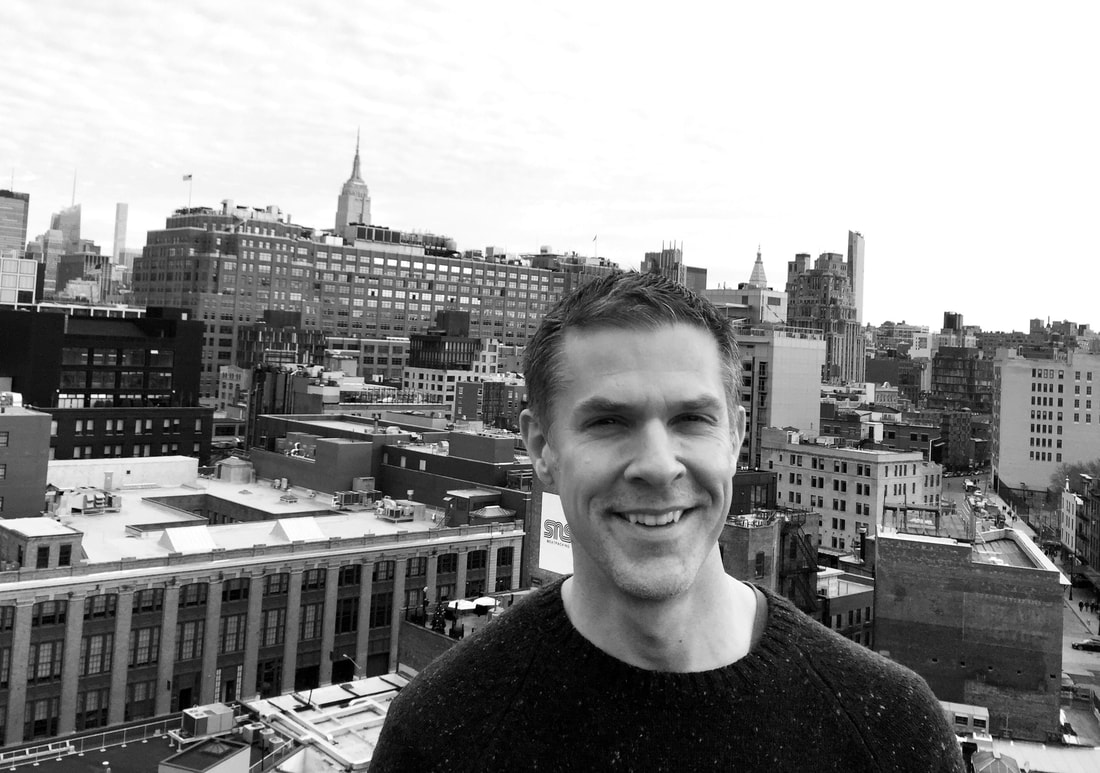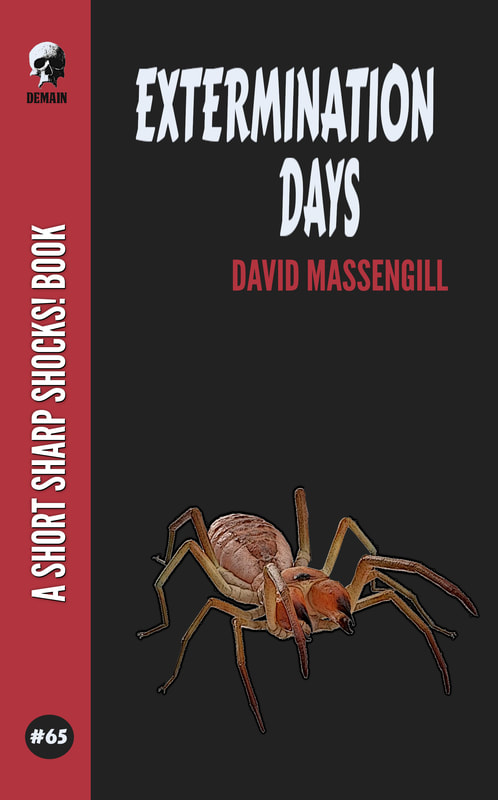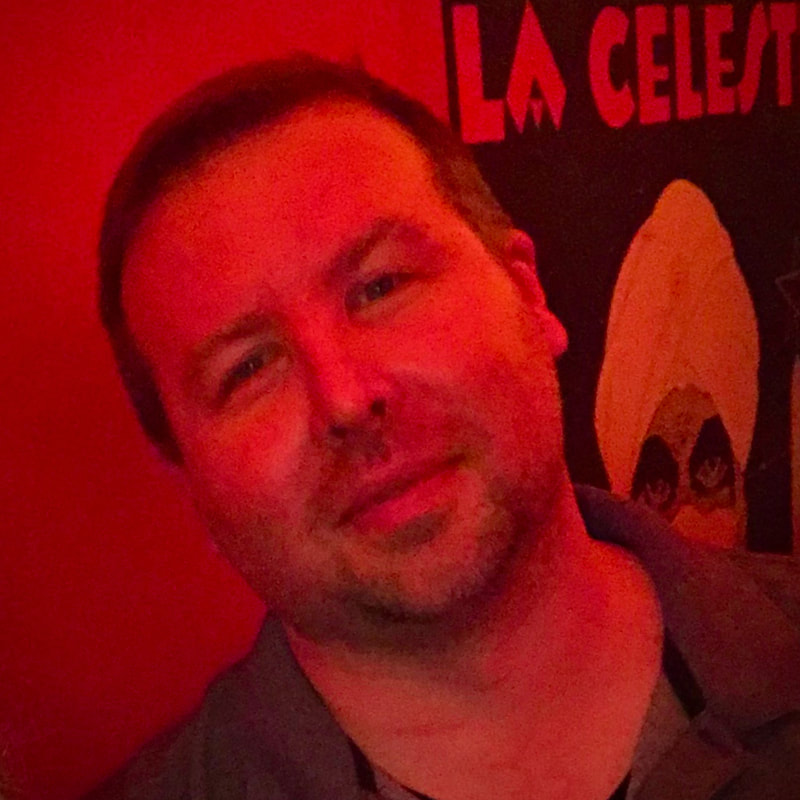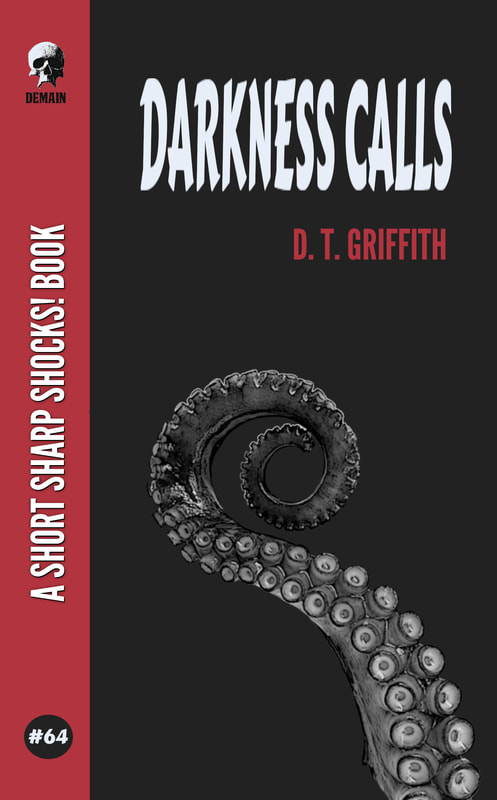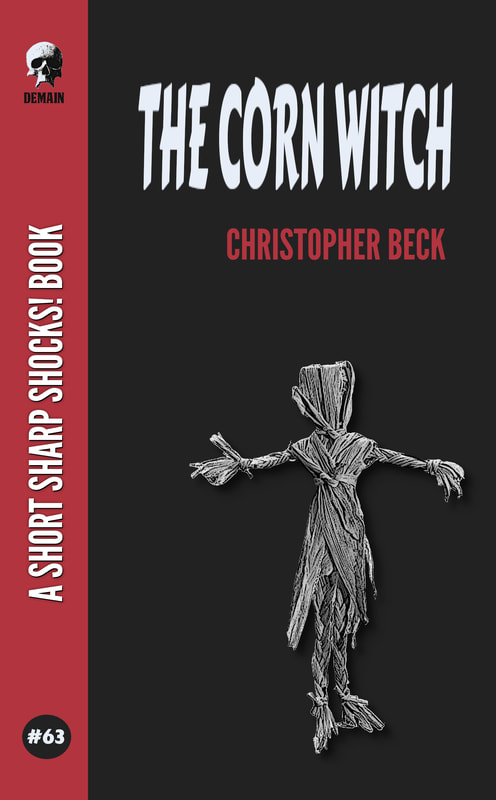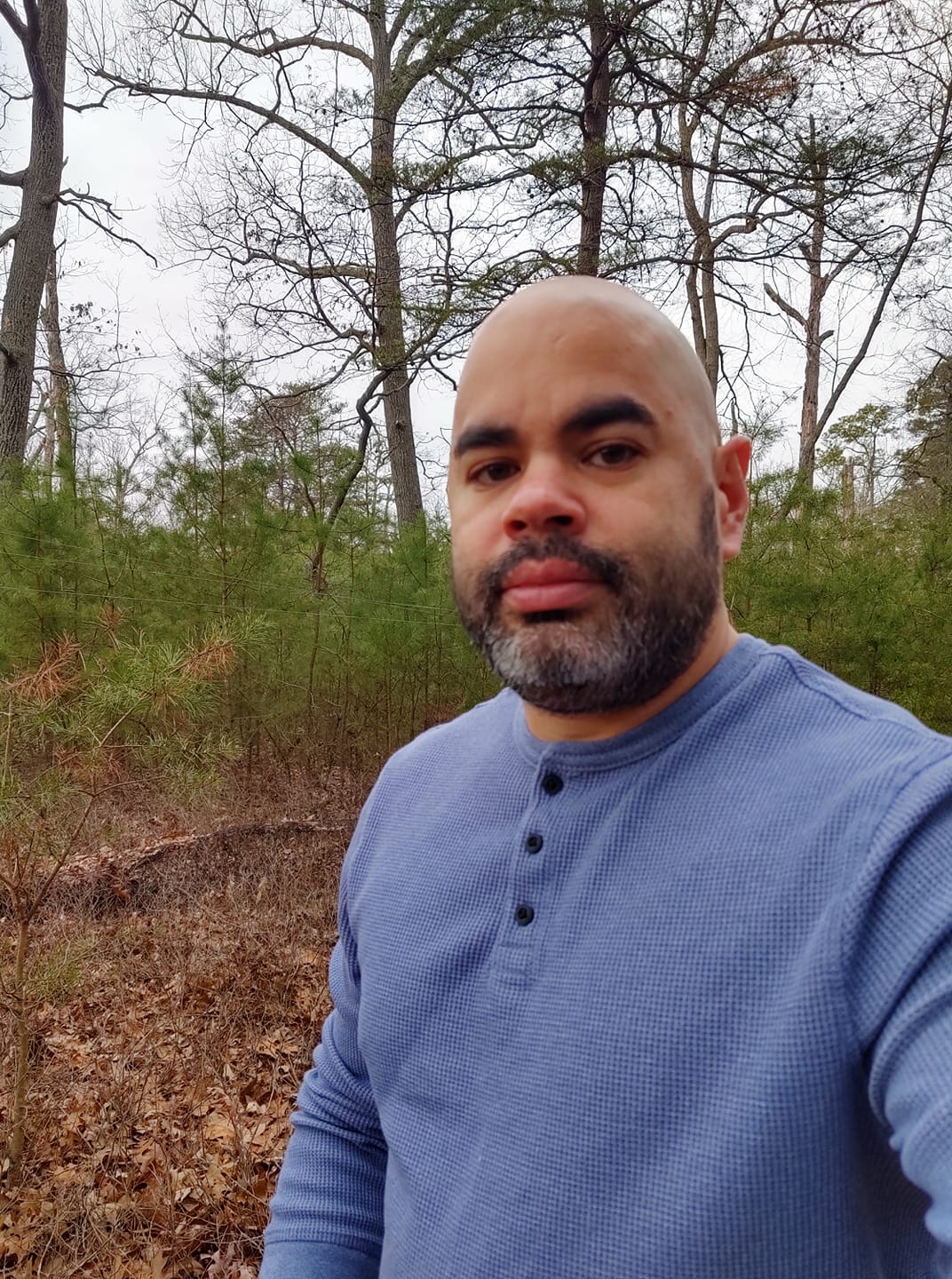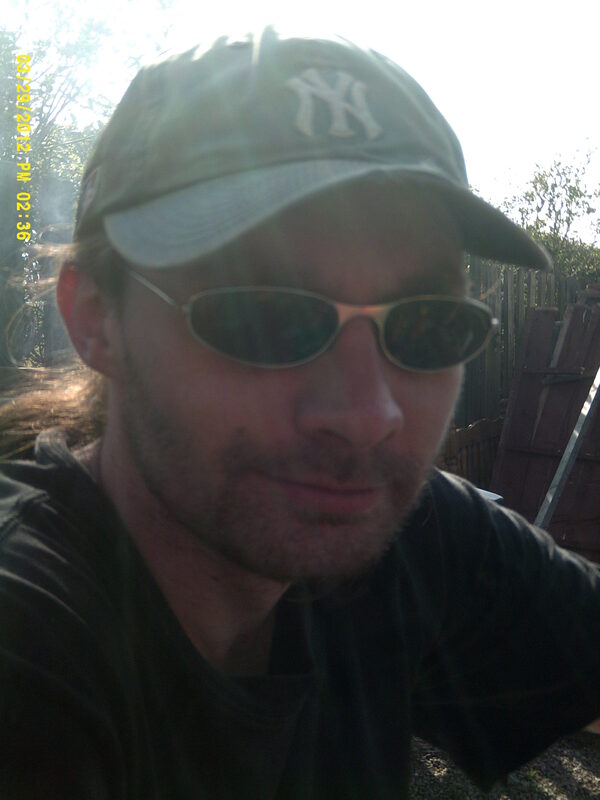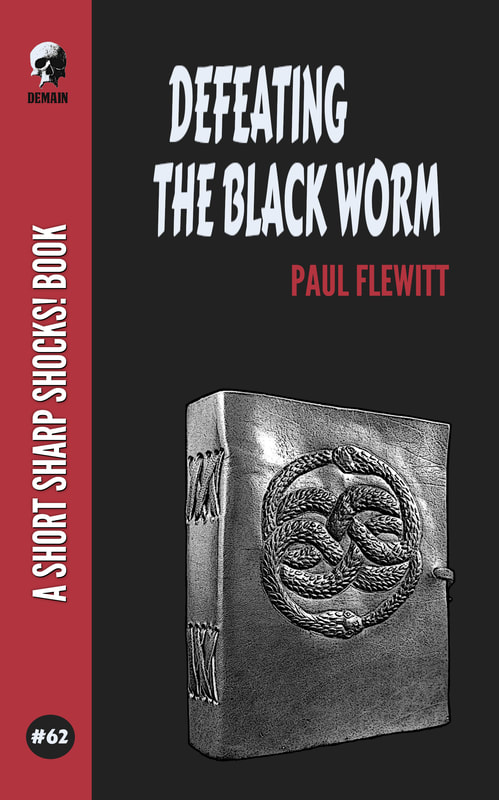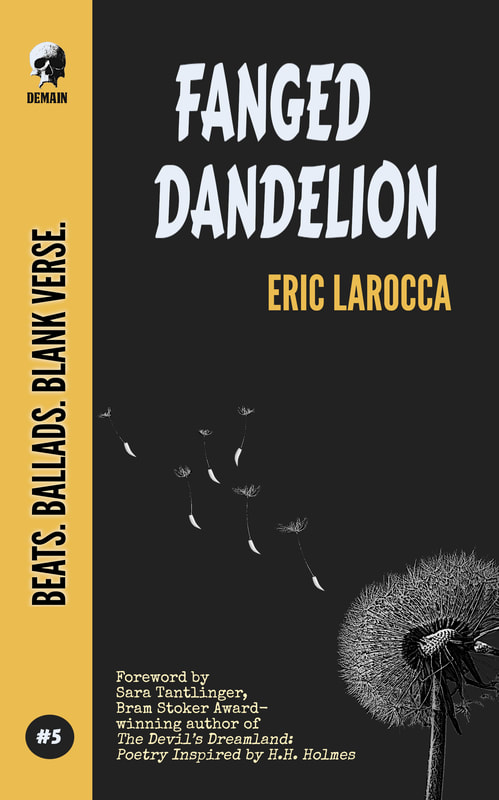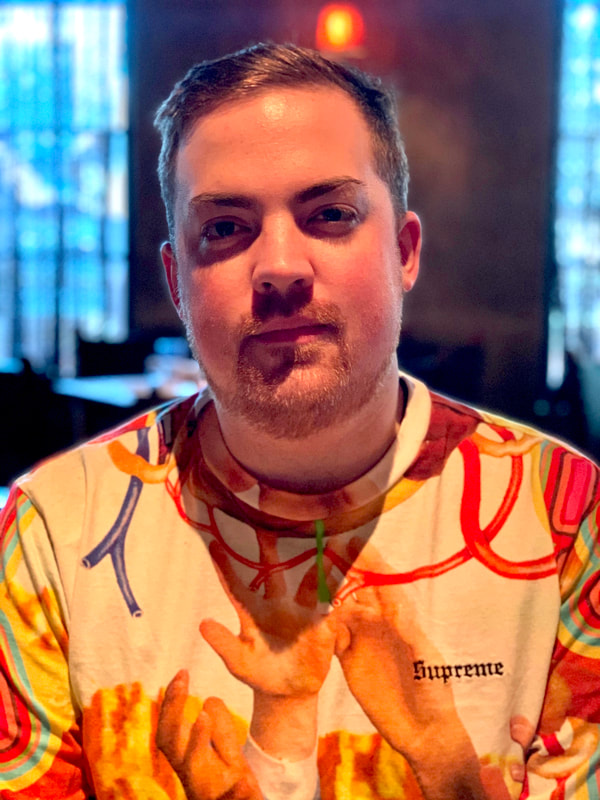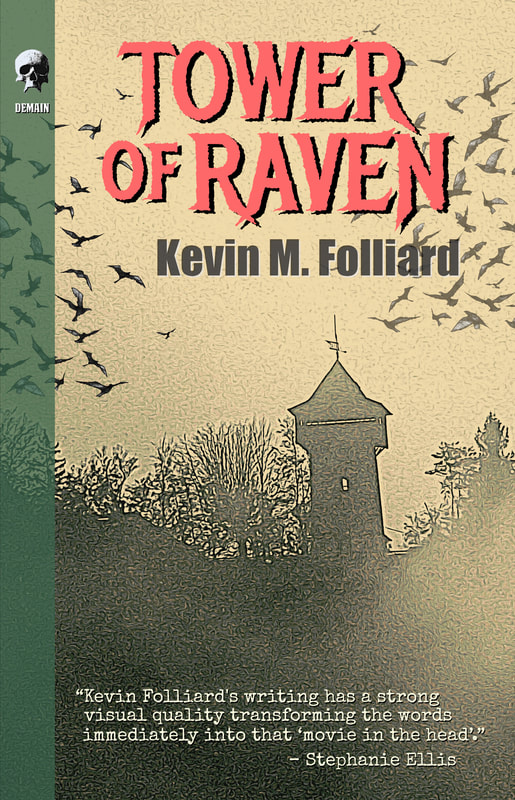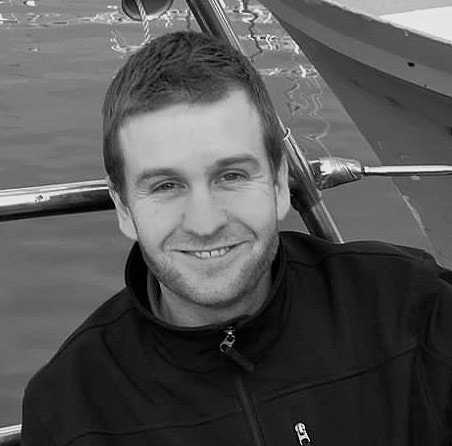|
|
|
December 31st sees the publication of Dan Weatherer’s novella Cheslyn Myre (cover by Adrian Baldwin) – currently available for presales. Dan is no stranger to DEMAIN with a contribution to the Short Sharp Shocks! series (Unnecessary Evil & Sick Girl – cover by Adrian Baldwin) and his recent release The Underclass (cover by Adrian Baldwin, central art piece by Roberto Segate). Dean and Dan recently talked all things Cheslyn Myre…
DEMAIN PUBLISHING: Great to speak to you again Dan, let’s get straight down to it, is Chesyln Myre based on a real town? DAN WEATHERER: Yes, Cheslyn Myre is based on the town I grew up in. Many of the places mentioned are real, with slight name tweaks here and there. The Air Ministry was also real. I say was, because it was decommissioned. I think it’s a private residence these days. DP: Reading your book brought back a memory of somewhere I lived in Kent when I was very young, there was some military ground nearby where we were ‘allowed’ to play. In the ground there were these metal doors which led to an underground chamber of some kind…I remember going into one once, I must have only been six, seven, something like that…scary but great fun ha ha. Anyway…did you find Cheslyn Myre difficult to write? DW: No, because this book is probably the closest work to resembling my childhood of all. It seems fitting that my writing career looks to be ending with this release, if only for now. DP: Indeed. When you create Dan do you challenge yourself or give your readers more of the ‘same’? DW: I think a quick glance through my back catalogue will show that I don’t have a set style of writing. I like to keep things fresh, as much for me as my readers. I like to challenge myself to different styles, perspectives, even media. I’m happy with what I’ve produced. DP: And we’re happy to work with you! Do you want each of your releases to stand on their own or are you trying to build a body of work with connections between each title? DW: There are some, subtle ties between books and stories of mine. Some take place in the same universe. Others visit the same locations, albeit at a different time. I like to leave details for my readers to come across. They aren’t integral to the story, but I see them as little rewards for my more dedicated readers. DP: That’s brilliant. Dan, what does horror mean to you? DW: It used to be my outlet – my way of processing the world and its demons. These days I’m not close to the genre. I think 2020 has forced great struggles on a lot of people, and while some find respite in horror fiction, I tend to find myself searching for lighter relief. While I was suited to the darker realms of thought and creativity, I no longer feel that is the case. Perhaps this book sees the end of that particular chapter – as I mentioned, Cheslyn Myre contains chunks of my childhood within its pages. Releasing it into the world is my way of letting it go. DP: That’s interesting and I don’t think you’re alone actually – it’s been a tough year all around hasn’t it – I wonder if as you say this will be your last ‘horror’ book? I think a lot of the more darker creators might end up expressing themselves in a different way moving forward just because 2021 has been so dark in so many different ways…on that depressing note, final question Dan: Do you interact a lot with your readers? If so, how / why? Any funny stories to tell? DW: I don’t. I’m quite reclusive. I used to when I was starting out as a writer, but these days I prefer a quieter life! Great chatting to you again Dan, all the best with Cheslyn Myre and here’s to a much better / brighter 2021. If you’d like to connect with Dan direct: Website: https://fatherdarkness01.wixsite.com/fatherdarkness Twitter: @withwelder Author Interview: A.S. MacKenzie, Unwelcome Space & Other Stories- Short Sharp Shocks! 6712/13/2020 Short Sharp Shocks! 67 released on the 31st December is A.S. MacKenzie’s Unwelcome Space. The cover is by Adrian Baldwin. It’s currently available for pre-sales. A couple of weeks before publication Dean and A.S. MacKenzie sat down and talked about it.
DEMAIN PUBLISHING: Welcome to DEMAIN! It’s a pleasure to have you as part of the SSS! series…what was your first introduction to the horror genre? A.S. MACKENZIE: My first introduction to horror was when I was in the 3rd grade and got my hands on an overlooked copy of The Pit & The Pendulum” by Edgar Allan Poe. I say overlooked because my school was in a very conservative area of the Appalachians and they would only allow stories like this to those in higher grade. I obsessed on this story as I read it and went out of my way to find more by Poe. Then, I discovered that he wasn’t the only one and then I grabbed whatever I could, be it pulp, comics, or novels. Concurrently, I also fell in love with Doyle’s Sherlock around the same time and with the help of the Hardy Boys and Nancy Drew, I found that the thing I loved the most from both mysteries and horror was the suspense. So, here years later, my writing focusses heavily on the thriller/suspense part of horror and less on the macabre or gross. DP: That’s brilliant – personally love a bit of Hardy Boys / Nancy Drew…so, your Short Sharp Shocks! ASM: I actually wrote this story right after listening to an audiobook about a cemetery on the moon. It spurned in me the idea that while we continue to expand ourselves out into the universe, there may just be some who don’t find us welcome. I also wanted to shy away from the typical ‘alien’ approach and make it something more sinister and unknown. Something you couldn’t see coming. A line in the audiobook really struck this idea home when they mentioned that when you’re in space, you don’t really see the stars due to the lack of atmosphere and the direct exposure to the sun. Just thinking about the inky blackness of it all made me think it couldn’t be entirely empty. DP: Interesting – and definitely agree it’s more sinister / unknown – which is what appealed. Well done. Did you have to do much research? ASM: This is where I show off just how much of a science geek I am and say I didn’t really have to research much at all, because I had already started studying the space station and other space faring vehicles long ago. Just for my own amusement and edification. I took that knowledge and envisioned the environment and scene as I went. There was one or two small names for things I had to remind myself of, but most of it was already up there in my mind. DP: Ha – that’s very cool, well done you! Can you tell me about other books / authors which influence you? ASM: I think every book influences a writer, in either big or small ways. I can’t count the number of books and authors I’ve read who have imparted something to me. If I were to be specific, the big names that come to mind right away are Jonathan Maberry and any book of his extensive library; Scott Sigler and his Earthcore epic, along with his recent Alien:Phalanx; Delilah Dawson with Phasma and her X-Files comic run; Nicholas Sansbury Smith and his Extinction series; and Chuck Wendig for his Miriam Black series and Damn Fine Story. DP: There’s some great titles – well worth checking out. What does horror mean to you? ASM: I find the best aspect of horror is the suspense and the thrill, or the tension, if you will. When thinking back on the stories that have stuck with me or creeped me out so bad I had trouble sleeping, they centre heavily on tension. Not the tension of ‘jump-scares’ which I find are a crutch and overused (though one or two in a story is fine), but the real building tension that comes from an increased sense of unease, danger, fear, or terror. Watching it build to a crescendo and then taking the read to the next step is what I live for in a story. DP: I’m with you…it’s been a tough year: would you say that the genre is affected by world events? ASM: There’s no way it couldn’t be. Even if we write for a certain period, our minds are locked inexorably here in time so what we experience and think goes into the story. With all the tumult of 2020, I won’t be surprised to find the stories we write now to reflect that in the dialogue, actions, character motivations, and outcomes. Whether it is to develop a shift in style to cope with what the writer is experiencing or using the words as a relief valve for the pent up feeling within. We will see the stories affected by this year and understand them as only those who have gone through this would. Whether that stands the test of time is to be seen. DP: Definitely – it’ll be interesting to see what the future brings in term of literature / films / culture…is there a new writer (or director) which interests you right now? ASM: I’m really impressed with the writers (Alan McDonald and Ryan McHenry) and the director, John McPhail, of Anna & the Apocalypse, more so than I have been with most others lately. Which is saying something because we’ve had a pretty good glut of entertainment come out in recent years. The movie is a campy, fun, rather bloody musical romp filled with tropes and I love it. It doesn’t take itself seriously, and doesn’t make fun of itself, either. The tropes are easy and fit with the story so well you don’t mind them at all. I’ve not seen a movie that easy to watch for a while and I hope to crack its secrets one day. DP: I’m not aware of that one so will check it out – thanks for the recommendation. There have been reports of late that the horror genre is dead…do you agree? ASM: Not remotely. Horror isn’t dead because we still have the capacity for fear. Admittedly, a great amount of the horror literary world has gone indie and away from the big publishers, which has made it more difficult for work to get in the hands of a large-scale audience. But, those indie outlets are as committed as the readers who know they are there. It might take a while for horror to claw its way back into mainstream so that the horror section of the bookstore is more than King and Koontz, but it’ll get there. Until then, it’s not going anywhere. DP: It definitely isn’t. So is writing a long term or short term career for you? ASM: Writing is absolutely a long-term career, though not the one I will use to pay my bills. I have a career that pays me well enough to keep my bills paid and food in my hand, while also giving me the flexibility to get into writing on my own terms and at my own speed. This has taken a LOT of the pressure off and given me the chance to write and submit to outlets with the knowledge that if they pass, it’s not the end of the line for me. If my writing takes off well enough to pay me a living wage, then I’ll probably put it to the side and cover my retirement so I can continue to write stories even then. DP: Final question then, do you interact a lot with your readers (or writers who have influenced you)? Any funny stories to tell? ASM: Yes, I try to interact with anyone who would like to. I send out a newsletter to around 1400+ subscribers and receive a few emails a month from readers with questions or comments. I’m also on social media regularly (maybe too regularly) and interact with readers, but also other writers. Both unknown and known. There’s even a couple of well-known writers who followed me back and we interact often. I’m also quick to promote writer friends about their latest achievements and releases. As for stories, it’s not as funny, but because of this social media interaction I’ve gotten a chance to meet some authors in the real world. One in particular, Scott Sigler, was such a defining moment for me as not just a writer, but a writer who interacts with others. It was after a panel at DragonCon and I’m sure he needed to go somewhere but he took the time to chat with me about one of his then upcoming stories, telling me about the characters, asking my opinion on some of it, getting my feedback on other things he wrote. It was such a good, genuine experience that really made me examine what I want as a writer. Do I want to just write a story and send it out, or do I want to write something and connect with someone about it. His kindness and openness told me the latter is the way to go. And on that note! Thank you so much for your time, the best of luck with your Short Sharp Shocks! If you would like to connect with A.S. MacKenzie direct: Website: www.asmackenzie.com Twitter: @a_s_mackenzie Insta: @asmackenzie A.S. MacKenzie also runs another Instagram account @oneposthorrorstory with short one-post drabbles and images. Entry 66 in the Short Sharp Shocks! series is Let Me Take You Down by Marc Shapiro. The book is out on the 31st December but is currently available for pre-sales. The cover is by Adrian Baldwin. Recently Dean and Marc talked about it…
DEMAIN PUBLISHING: Hi Marc, hope you’re doing as best as you can during this difficult period. For those readers who aren’t yet familiar with you or your work, can you tell them about yourself? MARC SHAPIRO: Hi, yes of course: Born in Boyle Heights, California. Grew up in Monterey Park on a steady diet of Saturday matinees and old pulps and paperbacks. Graduated from high school. Only a so so student. Spent two years in the army. Went to college. Got a degree in journalism. Freelanced for underground newspapers, music magazines and horror film publications like The Los Angeles Free Press, Zoo World and Fangoria. Started writing books. Wrote a shitload of books and still do. Happily married for better than 40 years. One daughter. One granddaughter. Film rights available. DP: Excellent! Fangoria is brilliant isn’t it – one off my bucket-list was when Barbie Wilde interviewed me a couple of years back – we had a fab time doing the interview and when it was published…still makes my heart beat a bit faster now…anyway, why did you become a writer… MS: I was always kind of introverted but had a creative outlook on things so, by the time I was thirteen, I figured writing was the way to go. I love the freedom that writing brings. I also love the idea of making a living doing what I love to do and proving decades of doubters wrong. DP: Without a doubt and good for you. What would you say was your first introduction to the Horror genre? MS: Too many to remember but some faves growing up were Robert Bloch, Richard Matheson, Harlan Ellison, Ray Bradbury. Movies like Frankenstein, Dracula, The Blob, The Wolfman, Attack Of The Puppet People, Them. You get the picture. Toss a dart in any direction in my world and you’ll hit an influence. DP: Which is exactly the way it should be – I know that certainly when I was younger and just starting out, though Horror was my be all and end all, my actually influences were far more ‘literary fiction’ – it all goes into the mix…so let’s talk about your Short Sharp Shocks! Let Me Take You Down. MS: It’s horror but I like to think of it as something more cerebral, something that makes its points without the necessity of exploding in your face. I had recently read the autobiography of Miles Davis and I found myself immersed in the culture of jazz and the collective tenor of the times. I knew there had to be a sense of menace and encroaching unease which is how I developed the sense of evil that had more on its mind than cheap booze and good music. It had to be a sense of something engrained in the culture. And for my money, there’s an underpinning to The Twilight Zone connected to it, something with a message or a philosophy that emerges in all the weird and erotic happenings as an ultimate truth. DP: I loved your approach and definitely agree that it is something ‘cerebral’ – here at DEMAIN we treat Horror as a very broad church, there’s room for all believers but I personally love something that really makes me think – so well done. What does Horror mean to Marc Shapiro? MS: Horror is an escape, just like any form of literature, at its core, is. Going to an unsettling place where evil or the personification of evil dwells and dealing with it is cathartic. It scares. It enlightens. Like all good literature, Horror is an escape. DP: Exactly – so what are you afraid of? MS: In real world terms just about anything on the 6 O’clock news these days is pretty frightening. Getting a job done to everybody’s satisfaction makes me uneasy a lot. Nobody is perfect but I think creative people in general, carry around a lot of emotional baggage and insecurities that cause them to lose a lot of sleep. My demons usually arrive around 3 a.m. and that’s usually the end of any hope for a good night’s sleep. DP: Yeah, and it’s been getting a lot worse for me this year – not getting much sleep at all and always feeling that there’s not enough hours in the day, worried a bit about the next ‘crisis’ coming down the road…it’s been quite depressing…did you find Let Me Take You Down difficult to write? MS: When I’m writing non-fiction I’m very focused on the manuscript and the deadline and that makes the process fairly stress free. My philosophy when it comes to writing fiction is that if an idea has been kicking around in my head for more than a couple of days, it’s worth writing. When that happens, I tend to write fairly quickly usually a day or two for the first draft of a short story, then a couple of passes through to self-edit and polish. I try real hard to finish something even if it means taking another look somewhere down the road. DP: That’s a good philosophy – I’ve personally got two story commissions on the go right now, need to get the first one finished before I can really work on the second…never suffered from writer’s block before but for some reason I’m really having an issue with the last few paragraphs…it’ll come I know but it’s been a pain in the proverbial these last couple of weeks…anyway, considering what we’ve been talking about (or perhaps it’s just the elephant in the room) – would you say that the Horror genre is affected by world events? MS: Certainly. You’re going to see tons of books with variations on the current pandemic in the coming years. The mess that our current political system is will be ripe with different takes on 1984. The Horror genre is like a sponge. Turn on the television, radio or read a newspaper and ideas are everywhere. DP: Ha! You’re so right – I’m working on a tv project with another writer - it’s period drama / sci-fi – and we were clear that though it’s going to be about the pandemic it’s got to be as far as away from current times as possible because we know it could just get rejected out of hand as “just another covid story” – which it isn’t really, that was just our way in. There’s also a French period history idea I’ve been trying to crystallize recently and found my angle and then realized that it could be viewed as being about covid which it definitely isn’t…with regards to yourself I would say that writing is a long term career? MS: Let me see. I’ve been writing professionally for more than fifty years which makes me older than dirt. I’d say I’m definitely in this for the long haul. DP: Good for you – okay, two quick questions. First, what is something your readers might be surprised to find out about you? MS: I once had an editor wave a loaded pistol in my face because I was hounding him for the $20 he owed me. I roadied for the band Blue Oyster Cult for a night while researching a magazine article. I was an extra for three days in a truly awful martial arts movie called Force Five, playing a Mexican prisoner who gets the shit beat out of him. But when the writing wasn’t paying the bills and you’ve got a family, you do what you’ve gotta do. DP: You definitely do – will have to check out that movie if I can – and finally then Marc, what, creatively, has been your biggest success to date? MS: I’ve had books on the New York Times, Los Angeles Times and Canadian Bestseller Lists. When you’re recognized, that’s definitely a plus in your heart and soul. But at the end of the day, it’s as simple as writing the best books you possibly can and finding out that people are reading them and enjoying them. That makes it all worthwhile. Doesn’t it just! Marc thanks for your time. Best of luck with your Short Sharp Shocks! More about Marc can be found at: Goodreads: Marc Shapiro (Author of J. K. Rowling) | Goodreads And: Marc Shapiro | Authors | Macmillan We welcome author David Massengill to DEMAIN with his Extermination Days, entry 65 in the Short Sharp Shocks! series. The book is out on the 31st December but is available for pre-sales now. The cover is by Adrian Baldwin. A couple of weeks prior to publication, Dean and David sat down and talked about it.
DEMAIN PUBLISHING: Hey David, welcome, welcome to DEMAIN. Pleasure to have you as part of the family now. So let’s talk about your first introduction to the horror genre. DAVID MASSENGILL: And a pleasure to be here…when I was 12, I was fortunate enough to go on a family trip to Europe. We visited England and Italy and Switzerland. For some reason my parents allowed me to buy Stephen King’s Pet Sematary—my first ‘adult’ novel—and I was as thrilled about reading that book as I was about seeing Stonehenge or the Colosseum or Lake Geneva. I didn’t start writing horror fiction until my thirties, and sometimes I wonder if my turning to the genre had something to do with that well-worn paperback copy of Pet Sematary. DP: I suspect it did – and that’s a great book…who else do you read and have they influenced you too? DM: My top three favorite genres are horror, literary, and thriller/crime fiction. I’m partial to—and inspired by—minimalist writing. (I prefer reading books that are under 300 pages.) I’ve learned much about economy of style from Hemingway, James M. Cain, Jean Rhys, and Richard Matheson. The author who made me want to start writing short horror fiction was M.R. James, the absolute master of the ghost story. DP: Definitely [Dean recently wrote a M.R. James inspired story for Trevor Kennedy’s Phantasmogoria James special –available on Amazon] agree with you there. What does horror mean to you? DM: I think of horror as exploration of ‘the shadow’—the part of ourselves or others or society that we fear or worry about or don’t understand—and death. Horror fiction and horror movies allow us to safely venture into uncomfortable areas, through narratives and characters and symbols, and we come out of that exploration a little more comfortable with the shadow or death. DP: That’s a great definition! Probably the wrong time to ask this but would you say that the horror genre is affected by world events? DM: Horror is an excellent way to process tragic world events. I’ve definitely relied on my knowledge of Historical Bad Things Peoplekind Has Done while writing my fiction. I’m of the opinion, though, that mixing horror fiction with real-world horror rarely works well. If something truly horrific happened in the past, why do you need to add an element of fictional horror to that? That being said, I’m going to contradict myself and say I’d probably enjoy a serial killer thriller set during COVID lockdown. DP: Actually I think I would too – let’s write it ha ha – creatively David is there something you haven’t yet achieved? DM: A novel in fragments or found documents. Or the short story In the Blood, 1982: An Incident Not Described in the Biography of Delilah Dawn, Scream Queen. Or a Paul and Jane Bowles-type novel (The Sheltering Sky-ish) set in post-apocalyptic California. I have a list of ideas that have made it into my fiction or have remained in limbo. DP: That’s very cool, I’d read them for sure – so writing is a long term career? DM: Writing is definitely a long-term passion for me, and I’ve been crafting fiction for over 20 years. I think writing is an incredibly isolating and slow-going activity that doesn’t really suit people who want quick rewards. Somehow I always feel a little happier and more centered after a productive writing session, and that’s probably what keeps me coming back to the blinking cursor. I also love when my fiction reaches someone years after I wrote it, and I find out that person was somehow moved or provoked or entertained by whatever story I told. DP: The lockdown then… DM: The lockdown has been helpful for my writing practice—especially in the beginning, when we knew so little about the virus and what could or couldn’t get us sick. During those early days when I was rarely leaving the house or seeing friends, I didn’t have the excuse for not sitting down to write at least once a day. Just before the pandemic began, I started drafting a novel about a haunted property in Seattle. I’ll probably always think of this novel as my COVID book even though it’s set pre-pandemic and concerns the supernatural. I’ve noticed the characters in the novel are at home a lot and struggling with isolation (in addition to the terrifying goings-on on the property). DP: Very clever! I like that idea – perhaps we’ll talk more when it’s finished. Finally David, can you tell us something your readers might find surprising about you? DM: After reading the post-apocalyptic stories of Extermination Days, they might be surprised to learn that I’m an optimist. Sure, the world will come to an end one day, but something else will begin. And on that note – thank you David for your time, the best of luck with your Short Sharp Shocks! If you’d like to connect with David Massengill direct: Website: www.davidmassengillfiction.com Twitter: @davidmassengill FB: https://www.facebook.com/David-Massengill-505537846164184/ We welcome back DT Griffith to DEMAIN and the Short Sharp Shocks! series of books with Number 64 – Darkness Calls. The cover is by Adrian Baldwin, the books is published on December 31st but is currently available for pre-sales – recently Dean and David sat down and talked about it…
DEMAIN PUBLISHING: Hello David! I hope life isn’t treating you too badly right now, considering! Your time is precious, let’s get down to it – can you tell our readers a little about yourself and how / why you became a writer? DT GRIFFITH: My personal and professional backgrounds have been based in some area of the creative world for as long as I can remember. I studied fine arts in college, originally focused on photography, but quickly branching out to other fine and commercial art mediums, including music and creative writing. As a result, inspiration comes from all sorts of directions, such as punk or classical music or surrealist paintings, which sparks the ideas that become elements of my stories or other creative outlets. DP: Oh, I love that – I think maybe I studied the wrong subject at college ha ha…anyway, what was your first introduction to the horror genre? DTG: This might sound ridiculous – at a pretty young age in the 1970s I loved the original Scooby Doo cartoons. I was always drawn to creative works that portrayed dark or scary elements, usually gothic or noir in nature, which the cartoon series was filled with. I loved dark atmospheric settings and creepy situations in any sort of show, song, or book. The ideas of ghosts and monsters both fascinated and scared me. This opened the door to watching horror movies like the original Halloween and Alien, as well as reading works by Emily Dickenson and Edgar Allan Poe among other classic and contemporary writers in-and-outside of the dark fiction genres. DP: “I would have got away with it” etc etc – that’s brilliant and yeap what a great series of cartoons! Talking about series, can you tell us about your Short Sharp Shocks! DTG: Darkness Calls weaves the real-world horrors of drug addiction and cult behavior with my own take on psychological horror. To be clear, neither is a reflection of my life. You could say I had Lovecraft on my brain while writing this story, though I’m not drawing directly from any specific stories or mythos. Rather, I used grotesque visuals to depict mental anguish and subsequent physical manifestations, though these imagined visuals are actually tethered to the underlying supernatural element. DP: I’m not a massive fan of Lovecraft but I loved the way you weaved the imagery in…did you find the book difficult to write? DTG: At times, yes. I strive to keep my work as original as I can, so I’m constantly backing away from tropes I often encounter in dark fiction books or movies and finding new directions that are unfamiliar to me. Whether I am successful in maintaining originality will be determined by the readers. DP: I really enjoyed reading it so well done! Could we talk about books or authors who influence you? DTG: I am all over the place with what I read. It’s the same with music – I’m not tied to one genre. I have been reading George Saunders regularly amidst numerous other indie and well-known authors. The reason I mention him is his fearlessness in trying new things with fiction, such as his novel Lincoln in the Bardo, which intertwines historical accounts with a ghost story told from multiple characters’ perspectives. I have come to love and appreciate how he layers humor and absurdity on top of incredibly uncomfortable and sometimes horrific situations. DP: That’s very cool, I need to read more Saunders asap. I love doing these interviews as I’m introduced to so many new voices, my TBR pile is so high now ha ha. Okay, so what does horror mean? DTG: To me, the horror genre is about facing subject matter that we are afraid to acknowledge or to confront, often stemming from the fear of the unknown and unexplained. It exists in everyday life on a small scale, yet it’s enough to be unsettling. I think some of the most horrific scenarios are internalized, such as facing one’s own mental decline or contending with a loved one’s battle with a disease. Whether it’s caused by panic of having no money for rent or witnessing a protest turned deadly, it’s the immediate uncertainty that follows and subsequent events that create the horror. DP: That whole realising you are declining mentally must be very very difficult for somebody to comprehend / understand / live through – it always sends a shiver down my spine…Is the horror genre affected by world events? Do you ever put world events in your work? DTG: Without a doubt. Just as with any other genre of fiction, real world events affect how we see, feel, and create. Obviously, some subject matters are far more polarizing than others, especially where politics and tribalism come into play, which opens the door to exploit fears and die-hard belief systems. So yes, I do incorporate real-world events, but more so as a backdrop or catalyst rather than being the actual subjects of my stories, such as the effects drug addiction have on a family used in Darkness Calls. DP: I keep hearing the horror genre is dead (yes, even considering the year we’ve had) – would you agree? DTG: Absolutely not, the horror genre is not dead, nor will it ever be. I see this often in music, for example, with the common proclamation that punk is dead. I find this to be the result of fans of a certain era of a genre being dismissive of the changes said genre has gone through as new creatives enter the field and others pull away. Genres constantly evolve. For anyone proclaiming horror or anything else is dead, they are welcome to live in a time capsule while the rest of us enjoy what we are doing to perpetuate it. DP: Creatively David is there anything you’d like to do that you haven’t done yet? If so – what is it? DTG: I would love to write the narrative for a long-form video game, or possibly, a feature film script. DP: That’s very cool – the best of luck. So writing is definitely a long term career for you? DTG: Writing is a long-term career coupled with the other skillsets I employ. Not everything I write is horror, or even fiction for that matter, as it plays a partial role in my current profession. I love to write and intend to keep doing it for as long as I can, whether to entertain or inform readers. If I can make some kind of money writing in my old age, all the better. DP: Indeed, indeed. Let’s talk the lockdown… DTG: The lockdown hasn’t truly ended as of the time I’m writing this – December 2020. We’ve hardly seen family and seen no friends because the disease infection rate has been consistently high in our region since March of this year and leading to many unfortunate outcomes. As a result, both my fiancée and I have been working from home since mid-March with no real end-date to this circumstance in sight. Since I currently don’t have my daily commute of an hour in each direction, I’m able to find productive uses for my personal time at home in this solitude, such as reading and writing far more often than I would be otherwise. I even took on a project of editing a short story anthology. DP: It’s been a tough one hasn’t it – as a full time writer I’m often in front of the laptop working on own but boy the last couple of months have been hard…in the UK where I currently am, the national lockdown has been lifted BUT we’re in the highest tier so nothing has really changed…I can’t wait until 2021…anyway, anyway…finally David, is there something your readers might be surprised to find out about you? DTG: I love video games even as a middle-aged adult. I grew up with them in the late 70s and throughout the 80s, so I have a particular fondness for the classic arcade stuff, though I do love a well-written and well-produced immersive experience like Red Dead Redemption 2. What a great place to finish! David thanks so much for your time. All the best with your Short Sharp Shocks! If you’d like to communicate with DT Griffith direct: Website: https://dtgriffith.com/ Twitter: @dtgriffith https://twitter.com/dtgriffith Short Sharp Shocks! 63 is The Corn Witch by DEMAIN author, Christopher Beck. The cover is by Adrian Baldwin. The book is published on the 31st December 2020 (though available at the time of writing for pre-sales). Early December, Dean and Chris had a quick chat about it:
DEMAIN PUBLISHING: Welcome back to DEMAIN Chris. We loved your new Short Sharp Shocks! Can you tell us about it? CHRISTOPHER BECK: Hi Dean, pleasure to be here. Yes – The Corn Witch came out of a conversation I had with my friend, Bill. He grew up across the street from a corn field and his brothers would scare him with tales of a witch that lived under the corn and flew over it at night. DP: I love it – as I said to you over email initially, I’m really digging American rural horror stories right now and this totally fitted the bill so thanks for that. Did you have to do much research? CB: There wasn’t a lot of research for this one, just the planting and harvesting time for corn in New Jersey. DP: So did you find it difficult to write? CB: The first go around turned out a bit cartoony, with less action and substance. Bill wasn’t feeling it. He was hoping for a take that brought to life the fear he felt as a kid. So I started again and it all came together. DP: Great! Creatively what is your biggest success to date? CB: I would say my first Short Sharp Shocks! The Birthday Girl And Other Stories, as it was my first stand-alone book. DP: It also got some cracking reviews…what does horror mean to you Chris? CB: Interesting question. Surely my answer has changed over the years but currently, to me, it means life. Life happens, and it isn’t always peachy. We all face hard times; dark periods; there isn’t always a happy ending. Horror is a part of life. DP: It is, with that in mind then, would you say that horror is affected by world events? Do you ever put world events in your work? CB: I would say a lot of horror is affected (low key or on a lager scale) by world events: it’s tough not to be influenced by what is going on around you. I can’t say I’ve put world events in my works, but I’ve certainly used life events. DP: Indeed you have…I keep hearing horror is dead…would you agree? CB: I would not. I would say, much like rock music, its heyday may have passed but that doesn’t make it any less Important or any less needed. And, there is still an incredible group of horror lovers out there. Life runs in circles, yeah? Horror’s time will come again. DP: Oh it will and we’ll be ready for it! What is Christopher Beck scared of and has it made its way into your work? CB: Loss, maybe, something I’m all too familiar with, and, yes, it has. DP: Creatively is there anything you’d like to do that you haven’t done yet? If so – what? CB: Still hoping to knockout that first novel, some novellas, and maybe even a film adaptation of a piece… perhaps The Corn Witch? DP: Well, you know my opinion on that last one! How did you handle the lockdowns – what was your routine, was there anything different you did to get through them? CB: A lot of hiking and exercise. I did a little drinking, too, at the start, but I wanted to improve my physical and mental health, so that’s what I did. The Corn Witch was written during that time, as well as a couple of other unreleased tales. And we look forward to reading them. Mr Beck – great chatting with you again. All the best with The Corn Witch. If you’d like to connect with Chris direct: Twitter: https://twitter.com/chrifive FB: https://www.facebook.com/chrifive On December 31st we welcome Paul Flewitt to DEMAIN with his Short Sharp Shocks! 62 – Defeating The Black Worm. The cover is by Adrian Baldwin and the book is currently available for pre-sales. In late November, Paul and Dean (who had previously worked together) sat down and talked about it.
DEMAIN PUBLISHING: Hello Paul – hope you’re well and safe. I know your time is precious so let’s get straight down to it…can you tell us a little about yourself… PAUL FLEWITT: Hi Dean. Great to be here. I know you already know quite a bit about me, so this is for the uninitiated. I’m a horror and dark fantasy writer from Sheffield, UK, and I live with my wife and two children, who I adore. I guess I’ve always been a writer in one way or another. My Dad encouraged me to read from an early age; there’s a story my parents told me about finding me reading to my classmates in nursery school when I was 4 or 5 years old, so storytelling has always been there. My Dad was a hobbyist writer, mostly of poems, and I do remember seeing him write a poem one time and annoying him with incessant questions (as kids often do.) He got annoyed and gave me a pad and pen, and told me to write my own poem. It was the first time I’d never really considered writing outside the classroom. Although English was definitely my subject and creative writing was always something I enjoyed and felt that I could do. After that, I never really stopped. I wrote poems and short stories which were terrible, trying my hand at longer stories and novels which were rarely ever finished. Then in 20111 I found myself out of work and struggling in the job market after the economic crash, so my wife and I discussed our options and she told me to give writing a serious go. Since then, I’ve written a bunch of short stories and a novel which have all been published and critically received pretty well. I’m working on more novels, and a trilogy as we speak. DP: So your background influenced you as a writer? PF: I’m very much a working class lad. I grew up on one of the most deprived estates in Europe, and my Dad was a former mechanical engineer who ended his days working in a distribution warehouse to make ends meet. I’ve worked in a number of different areas, from selling windows, to call centre work, to engineering factories and in care homes too. It’s all lived experience which finds its way into stories in some way or another. I would guess the biggest influence is in honing the ability to dream my way out of situations. It’s something I clearly did as a kid, living in the environment I did, with a lot of poverty around me. I had a good upbringing, raised by parents who did their best to provide for my siblings and I, but nobody really had a lot of luxury growing up, so I learned to invent my own in my head. DP: I’m with you – it does work its way in somehow. Now that I’m thinking about that I realise that my first ‘job’ after University was cleaning aeroplanes at Heathrow and recently I’ve been commissioned to write a horror movie set on a plane – talk about full circle ha ha! Okay, as I mull that over, what was your first introduction to the horror genre? PF: I guess the very first would be Grimm’s Fairytales when I was a little kid. Those stories are pretty horrific when you think about it, and pretty awesome. The first outright horror story I remember reading was in a children’s horror collection called “Cold Feet,” and featured a short story Philip Pullman called Video Nasty. I read that story until the pages started falling out. It intrigued me, and definitely gave me an appetite for darker works. After that, I suppose I discovered Stephen King and James Herbert … then Clive Barker absolutely changed my mindset on what dark fiction could really be. DP: Yeah, good old Clive – what an influence he’s been to our generation (and not just our generation mind you) of writes and readers. So your Short Sharp Shocks! PF: Ah, The Black Worm story is a curious one for me. I generally don’t write directly from my own experience, but this one was definitely borne from that and is quite personal to me. My Dad passed away a couple of years ago, which seemed to trigger intense panic attacks. I’d never had to deal with my mental health before, and now I was suffering anxiety which started to become quite debilitating throughout my Dad’s short illness and subsequent death. I started writing Black Worm as a very personal thing, to try and make sense of what was happening to me. There are a couple of scenes in the early part of the story that come from my personal experience, and things that actually did happen to me. So, Black Worm is about anxiety and how it can be crippling. It really drills down into how I was feeling, but then I took it somewhere else and turned it into a more fantastical horror story. It contains magic, demonology, blood and guts too. So, pretty much a “me” type of story, despite the personal undertones. It certainly isn’t a self-help book, and it’s not big on positivity. It’s quite bleak. Please understand, that I wasn’t writing it to make people feel better. It’s my story, and that’s all I can really write. DP: It is very bleak and as I said to you separately it does remind me a lot of Clive’s early work – which is a compliment – well done again for writing it and I hope your readers can really connect with it…did you to do any additional research? PF: I did a little bit. Obviously I’d researched anxiety pretty deeply, since I was trying to grapple with it at the time (and it is an ongoing battle as I write this,) so all of that was already fresh in my mind. Some of the arcane stuff and language is totally made up. I did try and get the Latin right, but I don’t think there is an exact translation for what I quote. When I write, I try to put just enough truth in there to make it plausible. I use very broad sweeps of the truth brush to make it sound authentic, but I’d say 98% of everything I do is made up. There is no Devil’s tongue. There is no Ekeneia, no Anguis. Those are all constructs of my imagination. DP: And what an imagination! I really enjoyed all the Devil’s Tongue stuff – resonated a lot with me. Because of what you’ve said so far, was the story hard to write? PF: No! This one flowed out of me. I guess because I was purging a lot of stuff that really was inside of me at that time, it was pretty stream of consciousness stuff. It took longer for me to decide whether or not to publish it than to actually write it. When all’s said and done though, it’s a good story, and one I’m pretty proud of. DP: And you should be. Creatively Paul, what is your biggest success to date? PF: I guess there are two answers to this one. Critically and fiscally, my novel, Poor Jeffrey is my most successful release. It made me some money, and people seem to enjoy it when they read it, so I have to say that. All of that said though, the one I’m most proud of is a story that you have some connection with, Dean. I think Climbing Out, which featured in your ‘Demonology’ (Lycopolis Press) anthology was some of the best writing I’ve done. I think that was one where I truly found a voice that I was happy with, and I really like the story I created. I think it was constructed very well, and the theme was something I really got my teeth deep into. It’s still a story I’m very proud of, even after all this time. Others may supersede it in future (I’m pretty proud of Black Worm, and it’s very close to Climbing Out in terms of execution, so is up there in my estimation,) but I don’t think I’ve got there yet. [SPOLIER ALERT: A slightly revised version of Climbing Out will be appearing as a ‘bonus feature’ in the upcoming paperback release – ETA spring 2021] DP: Besides King & Barker, what other books / authors do you read and are they influence? PF: I read all kinds of things, and not necessarily all horror. I enjoy Bernard Cornwell books, and I’ve just finished re-reading Philip Pullman’s ‘His Dark Materials’ books which really captivated me. I read quite a bit of high fantasy, like Tolkien, Brookes and Donaldson. My theory is that if something speaks to you, then it will inevitably find its way into your own writing. I call that my ‘choir’. I always say that you can hear many voices in my stories, but the soloist is very definitely me. DP: I love that! What does horror mean to Paul Flewiit? PF: For me, it’s always been about escape from the mundane. I think that’s why horror and fantasy work so well together, because they meet the same need to escape and go somewhere else. Even when times are bleak in the real world, it’s still almost comforting and cathartic to delve into a good horror story and escape for a while. Maybe it’s a “but for the grace of god go I” type of thing, like an affirmation that things could always be worse. I quite like Clive Barker’s analogy; that horror is like a roller coaster ride. People like the feeling of being out of control, but know that they can close the book and the experience will end. DP: So what do you think draws readers to the horror genre? PF:I think I answered this, in part, above but I would add that it’s really about good story. People want to be wrapped up in a good story, with relatable characters in peril. I think that’s what readers look for in horror. DP: You’re right – with everything that’s been going on in 2020, do you think the horror / fantasy genres are affected by world events and do you ever include world events in your work? PF: I definitely think it can be. I think when the whole COVID thing is over, we’ll see a swathe of books and stories around pandemic and being locked in. I think we’ll probably see quite a few on dictatorships and totalitarianism too. I think that’s almost inevitable, and people may need that to purge the experience in some small way. Personally, I try not to write anything based around actual events. It creeps in occasionally, but as a general rule I try to keep very much in a fantasy world. DP: Probably for the best and I think you’re right – there’s going to be a glut of covid related books / films…with that in mind, any upcoming horror book or film you’re looking forward to? PF: I always look forward to anything Clive Barker does, and next year is set to be a bumper year with a new novel, a short story collection and a poetry book. I also always look forward to anything Mark Cassell does particularly. As far as films go, I’m not really that big of a lover of horror movies. They rarely do the subject justice. It seems to me they rely far too much on gore and jump scares, which they overdo and make them cliché. Strange for a horror writer to not like horror movies, I know… DP: I’m with you don’t worry – I did watch (the last couple of days in fact) a Mexican / Spanish horror movie called [English Title] The Day Of The Lord on Netflix – wasn’t expecting much but found it quite effective (a little like The Exorcist with its tongue firmly wedged in its cheek I will admit) – I love non-Hollywood stuff, particularly European as you seem to get much more bang for your buck and it’s not as clichéd (in my opinion anyway) and as things stand I’m personally slated to direct a ghost / horror film next year and it’s going to have a lot of Italian / French influences…anyway, any new writer or director out there that interests you? PF: Okay, so now I’m going to call myself a liar here. Matt Shaw has been producing his own films over the last couple of years, and I think he does an amazing job. I always look forward to hearing about what projects he’s doing. He’s very much a polymath, being an author and a film maker. As far as new writers go, Mark Cassell isn’t really new, but I think he’s one that more people should be aware of. DP: Ah, Matt – know him well. He’s definitely one of the genre’s ‘doers’ isn’t he. Need a bit more like him. I’m personally not really aware of Mark’s work so will check that out asap. With those last two questions in mind, would you say the horror genre is dead / dying? PF: Absolutely not. I think it’s burgeoning in the independent scene, which the mainstream isn’t great at taking notice of. There is a following there, and a great group of writers making some very exciting art. If only the bigger markets would see them and snap them up, because there are a lot out there that deserve wider recognition. DP: Yeah, very very true. What scares you? PF: I think I fear the unknown, death, ageing, and dementia. I think those things appear quite a lot in my work, so maybe I’m confronting those things? DP: And creatively is there anything you’d like to do that you haven’t done yet? If so – what is it? PF: Absolutely. I’d like to see a movie made from one of my stories. I’m told I have a very cinematographic style of writing, and there are a couple of short stories and my novel that could be done very well. I am also keen to write and finish the trilogy that I’m working on, which is a step further into the darker end of fantasy. DP: So writing is a long term career for you? PF: Well, I’ve been doing it since 2012, so I don’t think there’s anything short term about it at this point. They say that overnight successes are a decade in the making, so maybe it’ll be my turn soon? DP: I hope it will be – you deserve it. How did you handle the lockdown – what was your routine, was there anything different you did to get through it? PF: I’m a stay at home dad who writes scary shit, so nothing really changed for me. Aside from homeschooling my son, and dealing with a daughter going through exams during the pandemic, it was really same old, same old. If anything, I was more productive because I couldn’t go and do stuff. I completed several short stories, two novels and made headway with two more novels over lockdown. Some of those were projects that I’ve been working on for two or three years, so it was nice to get them to my editor. DP: Yeah, I too tried to use the period as successfully as possible – though will admit the last few weeks of Lockdown 2 (and where I currently am we’re in Tier 3 still!) have been a bit tough. I need some ‘fresh air’ so to speak and can’t see that happening until early 2021…anyway, do you interact with your readers… PF: I try to interact as much as possible. I’m always around Facebook, Twitter and Instagram, and I just opened an account on MeWe. If people send messages or comment on posts, I try to always respond. I’ve also just started a WattPad account, where I’m writing stories and releasing them chapter by chapter, totally free to read. I’m hoping to build a little community there. I’m writing a fanfiction there right now, which I haven’t done since I was a kid, but I’m really enjoying doing that. All of that is an effort to be reachable, to let readers and potential readers inside a little bit. Hopefully they come check it out. DP: And finally Paul: what is something your readers might be surprised to find out about you? PF: I’m not sure that there’s anything that anyone would be particularly surprised by. I’m a pretty open book, so people probably know quite a lot about me already if they follow my social media. I’m not good at pretence, so what you see really is what you get with me. Perhaps I should make something up? Haha – and on that note…thanks a million for your time – all the best with your Short Sharp Shocks! If you’d like to connect with Paul direct: Twitter: @RealPaulFlewitt Facebook: https://www.facebook.com/Paul-Flewitt-Author-of-Dark -Fiction-352745188170046 Instagram: @paulflewittauthorofdarkfiction MeWE: @PaulFlewitt Wattpad: https://www.wattpad.com/user/DarkFantastique We welcome Eric LaRocca to DEMAIN and the Beats! Ballads! Blank Verse! series of books with his Fanged Dandelion. His collection is published on the 31st December but is available now for pre-sales. The cover is by Adrian Baldwin and we are also lucky to have a foreword written by Sara Tantlinger - Bram Stoker Award-winning author of The Devil’s Dreamland: Poetry Inspired by H.H. Holmes. Dean and Eric recently sat down and talked.
DEMAIN PUBLISHING: Eric! Great to meet you, welcome to DEMAIN. ERIC LaROCCA: A pleasure. DP: So let’s get down to it – can you tell us a little about your background. ELR: Sure, I suppose I come from a literary background in the sense that both of my parents emphasized the importance of reading to me from a very early age. They, themselves, are avid readers and are lovers of literature. My mom, especially. She would often take me to the local library and let me pick out which books I’d like to read for the week. It was there I really developed an interest in writing and creating different worlds to which I could escape. My mom remains my biggest advocate to this day and she usually reads all of my material before it’s eventually published. DP: That’s very cool – so before your mother reads them, how do your poems develop? Do you have a particular writing method? ELR: The writing process for Fanged Dandelion was very spontaneous and consequently very organic. I wanted to write about my fragile mental state while in lockdown during the Covid-19 pandemic, but I wasn’t sure how to broach the subject. Moreover, I wanted to candidly write about something I suffer from – intrusive thoughts. (For those who aren’t familiar with intrusive thoughts, they’re typically unwelcome or unpleasant thoughts that may eventually take form as an obsession.) I wanted to be as vulnerable as possible writing this project and my partner suggested I attempt to write poetry. Because he was so instrumental in the genesis of this idea, I fed him drafts of my poems daily – sending him sometimes three or four poems at a time. I used to not show others my works in progress out of fear of superstition. However, I find myself welcoming the idea of feedback throughout the writing process and I’m eager to share my work even in its infant stages. DP: The pandemic has been tough for a lot of people and it seems you’ve had it tougher than a lot – it’s great that you’ve been able to create and make something positive from the nightmare we’ve suffered during 2020. Could you tell us how you start a poem – is it different to beginning a short story (as an example)? ELR: I’m a very visual writer, so I typically begin a poem with an image or a concept I’d like to explore. From there, I build the skeleton of the poem. Then, once I’ve established some key visual elements I’d like to incorporate, I flesh out the poem from there. It’s a very impulsive process and far less structured than my arrangement when writing fiction. It was so refreshing to write, in fact. When writing fiction, I’m usually chained to an outline – shackled to structure – but, with poetry, I feel a much more profound sense of freedom to take risks and to write from wounded places. DP: That’d be a great title: “Writing from Wounded Places” – might have to borrow that…would you say writing poetry energises or exhausts you? ELR: It’s very interesting you ask that, because I found myself completely exhausted while working on this poetry collection. At the time, I wondered if it was merely fatigue from being cooped up inside all the time. But, at I look back on the period of my life when I was writing these poems, I can’t help but wonder if it was because being so vulnerable and so exposed took a toll on me. I think poetry is such a rewarding art form and I encourage all writers to try their hand at it at some point in their writing life. However, poetry can be soul-sucking sometimes. It can exhaust you completely. DP: I get that, in my younger days I did write a lot of poetry and I’d often go into a ‘fugue state’ whilst writing and when I was finished I was bleedin’ shattered – after a few collections, I retired as it was seriously fatiguing me. Problem is, I’ve been thinking about starting writing again…anyway…would you say poetry has a purpose? ELR: I think poetry affords the writer the opportunity to expose their demons – to exorcise and revitalize. I think poetry serves a purpose for the reader as well as the writer. Poetry shows us that we’re not alone – that our fears, our insecurities, our uncertainties are understood by others and that we are not alone. DP: I get that and that’s why I love Arthur Rimbaud so much – I’ve really connected his work (in both English and French properly now) and words and I’ve often got a copy of his poems in the near vicinity (in fact I can see one collection just on the table to my right ha ha). How did you first get published as a poet by the way? ELR: Believe it or not, my experience at DEMAIN has been my first experience as a published poet. Although I had a few poems published in various high school-level literary online zines, my collection with DEMAIN will mark my debut as a poet. I’m so grateful to you Dean for this opportunity as it means so much to me. I can certainly tell you this will absolutely not be my last poetry collection. After the transformative experience I had writing Fanged Dandelion, I can assure you that poetry will most certainly remain in my future. DP: That’s brilliant – we really enjoyed the collection and it deserves to do well. Who are your favourite poets and are you reading anyone at the moment? ELR: Tennessee Williams will always hold a special place in my heart as one of my favorite playwrights/poets. Although audiences/readers are far more acquainted with his works for the theatre, many might be surprised to know he wrote a series of published poems. His work is always tender and deeply wounding. As far as modern poets go, I’m very impressed by the work of Stephanie M. Wytovich. Her writing is splendid and profoundly aching. I’m, of course, a huge admirer of Sara Tantlinger – the Bram Stoker award nominated author of the introduction for Fanged Dandelion. I’m also such a dedicated fan of Cynthia “Cina” Pelayo. Her writing is always world class and I’m especially eager to begin reading her latest offering, Into the Forest and All the Way Through. DP: Ah, Tennessee! There was a bar in Cannes where I used to drink a lot as it was quiet, tucked away from the main drag and was small, personal – anyway, apparently he used to drink there all the time when he was visiting – not sure if it’s true actually but it was a nice story the owner always used to tell me. It’s become an ice-cream parlour now which is a shame…Eric, any advice you could give an aspiring poet? ELR: I don’t know if I’m qualified to give expert advice as I’m somewhat of a novice to the world of poetry, but if asked to guide an aspiring poet, I think I would simply tell them to be fearless. Write from the scab that never healed. Dip your pen in the wound that never closed. Be as vulnerable as possible and write what upsets you. I would urge them not to be scared simply because what haunts them most likely haunts another reader – this is an opportunity to connect with another person and have them understand you in a very unique way. Poetry is a glimpse into humanity. I would urge them to take pride in that fact and write from the heart. Thank you Eric for your time – we really appreciate it. Welcome to DEMAIN and the best of luck with Fanged Dandelion. If you’d like to connect with Eric direct: Website: ericlarocca.com Twitter: @ejlarocca Instagram: @ejlarocca On 31st December, we will publishing Kevin M. Folliard’s new novella Tower Of Raven – a fantasy / horror novella (cover by Adrian Baldwin; ebook available now for pre-sales). Kevin is part of the DEMAIN family having published his Short Sharp Shocks earlier in the year (Candy Corn). Recently Dean and Kevin sat down and talked about it.
DEMAIN PUBLISHING: Great to work with you again Kevin, glad that you’re well and safe. Let’s talk Tower Of Raven which we enjoyed immensely. What was your first introduction to the horror / fantasy genre? KEVIN M. FOLLIARD: And happy to be back working with DEMAIN. One of my earliest memories of opening a book was my Mom’s illustrated hardcover copy of The Hobbit, which had stylish maps and illustrations of characters like Smaug the Dragon. The Hobbit would become my favourite book as I got older, and it made me very interested in world-building and adventure. I first became interested in horror through Alvin Schwartz’s Scary Stories to Tell in the Dark anthologies. Again, I loved the illustrations, as well as the chilling, bare-bones accounts of folklore and urban legends. DP: Ha – my grandfather leant me his copy of The Hobbit – if I remember it was a white covered paperback copy and yeah, it was full of maps / illustrations too – great memories. So – Tower Of Raven… KMF: Tower of Raven is on its surface a re-imagining of the Maiden in the Tower/Rapunzel fairy tale. I had a vision of a raven-haired beauty who was a darker version of Rapunzel, and used that as my premise, but the story ended up taking on a life of its own. It became more about the Prince—which maybe was my way of rebelling against the cardboard cut-out prince characters in older Disney films! Tower of Raven explores nature vs. nurture through a classic fairy tale premise. It answers the question: If an evil witch kidnapped a princess and raised her in seclusion, would that princess be inherently good? Or would she end up as evil as her adopted mother. The story is about Prince Cedrick coming of age and struggling into adulthood. Cedrick rebels against a path that was set for him by his royal birth, and as a result, becomes entwined with Raven’s fate. Both characters had big decisions about their lives made for them by others at a young age. In many ways, Raven and Cedrick are opposite sides of the same coin, which makes for a powerful and volatile attraction. DP: It definitely does. In writing your novella did you have to do much research? And what do you do to research? KMF: For this story, I did refresh myself on the Maiden in the Tower lore, so as I was exploring the story and letting it go in its own direction, I had the tropes and story beats of classic Rapunzel tales in the back of my head. I wanted to try to keep core architypes of the story present, but in fresh or unexpected ways. Like Rapunzel, Raven’s story involves a garden of greens, being locked in a tower, a princely saviour, the birth of twins, blindness, and other elements, but the focus ultimately remains on Prince Cedrick and Raven, who they are, how they came to be, and what happens when their dreams are at odds. DP: So would you say you found it difficult to write? KMF: I think the hardest part about writing is staying motivated and forcing yourself to do it. I’m almost never “in the mood” or inspired to write, and I have to think of it as work. If I force myself to sit down and create prose—and don’t hold unreasonable standards of perfection on that rough draft—then the story comes. You can always go back and fix your prose, so being disciplined is harder than the actual writing process for me, which is often very time-consuming, but doable. I am most productive when I set goals, such as one chapter a week or X number of words per day. Having writer friends who you can check in with on a weekly basis for accountability is very helpful to me, and I’ve been doing that lately with my friends from the La Grange Writers Group. It’s made a big difference in helping me generate new material. The writers groups I attend definitely made the process of writing Tower of Raven easier, because they were critiquing older chapters as I was drafting new ones, so I was motivated to keep working so I had something new to submit. DP: That’s a good way to keep the momentum going…though you originally wrote Tower Of Raven prior to Covid, do you feel that it can now be read as a metaphor for the pandemic? KMF: I hadn’t thought about that! Interesting question! So, yes, it certainly was drafted well beforehand, so there was no “Covid influence” in the writing of the story. However, I can see how people might relate to Raven, locked in her tower by herself. Those of us who are quarantined in isolation face many challenges in staying connected with others, and isolation absolutely can have a toxic impact on people. DP: Exactly. Kevin – what is your biggest creative success to date would you say? KMF: I have a number of upcoming projects that I’m excited about, but as far as published works I’m most proud of, I’ll have to call it a tie on a few of my favourites:
KMF: Sci-fi, fantasy, and horror are the “what if” genres, and people like them because they allow us to explore otherworldly possibilities vicariously through the characters. In the case of horror, they allow us to confront danger from the cozy safety of a favorite reading spot. I think most readers of these genres are simultaneously looking to escape, while exploring their own humanity in “how and why” people react to extreme situations in certain ways. In my opinion, the fantastical part of these genres (which is so much fun!) is just a vehicle to explore very real human emotions and behavior. DP: Would you say then that the horror / fantasy genre affected by world events? Do you ever put world events in your work? KMF: There is a strong dynamic relationship between world events and fiction, including fantasy and horror. Fantasy in particular allows a lot of social or political problems to play out filtered through the lens of another world—just look at Game of Thrones, for example! I think that happens naturally when world building and thinking about who is in charge in this world, what are their motives, and what naturally happens as a result. I don’t often insert specific world events or historical landmarks into my stories, but I’ve certainly seen it done very effectively. DP: Your dead right about Game Of Thrones – a great way of teaching history to people without them realising it ha ha. Is there a horror / fantasy book / film that you’re particularly looking forward to? KMF: I’m excited for almost any new movies we get in the next year, and I look forward to hopefully seeing some big ones on the big screen when it’s safe for everyone to do so. I’m particularly excited to check out Wonder Woman 1984 and the new Candyman movie that keeps getting pushed back. DP: Yes, I know what you mean about Candyman…have to stick with the original(s) for now then! Kevin – is writing a short or long term career for you… KMF: Long-term. Writing is very time-consuming, and most of the time it doesn’t feel like you get much return on your investment. So in that regard, it’s tempting to think I can just retire from it and enjoy other things, but it’s more of a personality drive than a goal for me. I probably will always circle back to write a short story or come up with a novel I have to “get out” of me, even if it sounds more fun and relaxing to do other things. I’d feel unproductive if I didn’t have some kind of creative outlet. DP: And finally then Kevin – the lockdown(s) – what were your routines? How did you get through it? KMF: I was lucky that for my 9-5 job working in higher education, I was already working remote for an online writing center. In that regard, the lockdown wasn’t a big adjustment for me, but I did branch out and watch a lot of new movies. I saw drive-in movies, played video games, and customized action figures, in addition to working on fiction writing. The hard part for me was finding ways to get out and break up the routine of standing in front of computers and devices, so taking a lot of walks was key too. Yes – me too (walking that is!). Great speaking to you again Kevin – the best of luck with Tower Of Raven. If you’d like to connect with Kevin direct: Author Website: http://www.kevinfolliard.com/ Facebook: https://www.facebook.com/kevinfolliard Christmas Terror Tales on FB: https://www.facebook.com/#%21/pages/Christmas-Terror-Tales/204731106257625 Amazon: https://www.amazon.com/Kevin-Folliard/e/B0097S7T0A%3Fref=dbs_a_mng_rwt_scns_share Instagram: https://www.instagram.com/kmfollia/ Twitter: https://twitter.com/Kmfollia YouTube: https://www.youtube.com/user/kmfollia Linked-In: https://www.linkedin.com/in/kevin-folliard-36ba6028 Goodreads: http://www.goodreads.com/author/show/5266996.Kevin_M_Folliard |
CategoriesArchives
July 2024
AuthorDean M. Drinkel |
